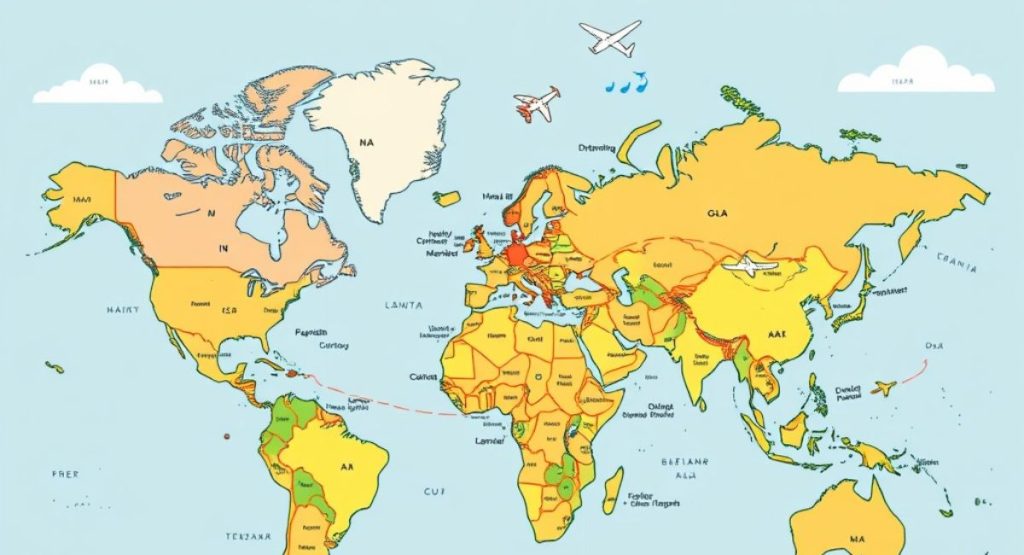Applying for a New Zealand visa is an exciting step, whether for work, study, or exploring the country’s breathtaking landscapes. However, the process can be complicated, and even small mistakes can lead to delays or rejections. Understanding the most common pitfalls will help ensure your application is smooth and successful. Here are some of the most frequent errors to avoid when applying for a New Zealand visa, along with tips to guide you through the process.
Submitting an Incomplete Application
One of the most frequent reasons visa applications are denied is incomplete submissions. It’s not enough to just fill out the form. Each visa type comes with a list of required fields and documents that need to be provided. Unfortunately, some applicants skip questions they believe don’t “apply to them” or fail to attach adequate supporting documentation. NEW ZEALAND VISA WITH DUAL CITIZENSHIP.
For instance, leaving out important details such as your travel history or failing to sign your application can result in immediate delays or even rejection. Additionally, many applications require proof of financial stability, travel insurance, and relevant approvals. Forgetting even a single item could jeopardize your chances. Always double-check the application form, and use the accompanying checklist provided by Immigration New Zealand to ensure every detail is accounted for.
Providing Incorrect or Misleading Documentation
Submitting incorrect documentation is another common mishap. This often includes misinterpreting what is required, such as providing uncertified copies or outdated materials. It’s crucial to understand that while you may have similar documents, such as a passport or financial statements, they must strictly meet the visa’s guidelines.
For example, if you’re applying for a student visa, you must include an offer of place from a New Zealand institution. If the institution is not accredited or recognized by Immigration New Zealand, your application will be rejected. Some applicants also fall into the trap of submitting fraudulent documents, either intentionally or unknowingly. Be sure to thoroughly research and provide genuine, accurate information that aligns with the visa requirements.
Double-check all documents you upload or submit to ensure they are recent, certified (if necessary), and translated into English when required. It’s better to take your time and verify every piece than risk the delays caused by incorrect submissions.
Misunderstanding Visa Types
Applying for the wrong visa type is another common mistake that can derail your plans. New Zealand offers a variety of visas tailored to different purposes, such as visitor visas, work visas, study visas, and residence visas. Each type has distinct eligibility criteria and documentation requirements, so identifying the right category is critical.
For instance, some applicants intending to work temporarily in New Zealand mistakenly apply for a visitor visa without realizing that this visa doesn’t permit employment. Similarly, students might apply for the wrong subclass of a student visa, causing rejections or delays. Misunderstanding these distinctions can lead to wasted time and resources.
To avoid this situation, review the New Zealand Immigration website thoroughly. They provide detailed explanations of each visa type and even offer a “Visa Wizard” tool to help you identify which visa aligns with your purpose of travel. If you’re still unsure, consult with an immigration advisor who can offer expert guidance based on your individual circumstances.
Ignoring Visa Deadlines
Many applicants underestimate the importance of timing in the visa application process. Missing important deadlines can result in unnecessary stress or even an outright disqualification of your application. Some visas have fixed submission and processing periods, which vary depending on the type of visa and your country of origin. NEW ZEALAND VISA TRANSFER TO NEW PASSPORT.
A common error is waiting until the last minute to gather documents or submit your application. If there are errors in your paperwork, you may not have enough time to make corrections. Additionally, processing times can be unpredictable, leaving little room for emergencies or delays.
To stay on track, create a timeline of all key dates for your visa application, including submission deadlines, interview appointments, and expected processing times. Start your preparation as early as possible, and be proactive rather than reactive in managing your application.
Failing to Meet Financial Requirements
New Zealand requires visa applicants to demonstrate their financial ability to support themselves while in the country. Insufficient proof of funds is a common reason applications are denied. Depending on your visa type, you might need to show that you have enough money to cover your living expenses, tuition fees, or transportation costs.
Some applicants make the mistake of providing vague or incomplete evidence, such as unverifiable payment receipts or bank account statements that don’t meet the required balance. Others try using outdated bank records, which may not reflect their current financial standing.
To prevent these mistakes, carefully review the financial requirements for your specific visa. Include clear, up-to-date evidence such as certified bank statements, scholarship letters, or financial guarantees. Make sure your documents demonstrate a consistent and reliable ability to meet the required income thresholds.
Overlooking Health and Character Requirements
New Zealand places a strong emphasis on the health and good character of its visa applicants. Many applications face delays because people neglect these requirements or fail to provide accurate information regarding their medical history and criminal records.
For example, you may need to undergo a medical examination to prove you’re in good health. Ignoring this step or submitting inaccurate results could stall your application. Similarly, individuals with past criminal convictions might overlook the need for police clearance certificates or fail to disclose minor infractions, which can lead to complications.
Always approach these requirements honestly and thoroughly. Schedule medical examinations well in advance, particularly if you need additional health assessments. If you have a criminal record, consult with an immigration lawyer to better understand your options and obligations before applying.
Not Seeking Professional Advice
The visa application process can be challenging to navigate, especially if you’re unfamiliar with immigration laws and policies. Attempting to handle the entire process without professional guidance can lead to costly mistakes. While some applicants successfully submit applications on their own, others find themselves stuck in complicated situations due to lack of expertise.
For instance, misunderstandings about eligibility criteria or complicated appeal procedures often arise without professional assistance. Immigration consultants have a deep understanding of New Zealand’s visa processes, and they can provide valuable advice tailored to your unique situation.
If your application has been rejected in the past, or if you’re dealing with complex circumstances like a criminal record or incomplete documents, seeking professional guidance is highly recommended. A licensed immigration advisor can help reduce risks and improve your chances of success.
Lack of Proper Communication
Immigration New Zealand may contact you with questions, requests for clarification, or updates during the application process. Some applicants miss out on key opportunities because they fail to respond promptly.
For example, if you’ve uploaded the wrong document or your contact details change, it’s your responsibility to resolve the issue as quickly as possible. Failing to monitor your email or phone could result in missed deadlines or incomplete requests, placing your visa application at risk.
To avoid this, always keep your communication channels open. Double-check the contact details you’ve provided to ensure they’re accurate and encourage frequent checks on your inbox and voicemail so you don’t miss important correspondence.
Ignoring Renewal or Extension Rules
If you’re already in New Zealand on a temporary visa, another common oversight is failing to understand when and how to renew or extend your stay. Expired visas can lead to severe consequences, including being asked to leave the country or facing difficulties in future applications.
Many people assume that they’ll automatically receive a reminder to apply for renewal. This lapse can leave them scrambling for time when their visa approaches expiration. Additionally, some are unaware that they must adhere to specific regulations while waiting for approval of an extension.
Be proactive about tracking your visa’s expiration date and understand the process for renewal or extension. Submit your application well ahead of the deadline to avoid stressful last-minute issues.
Final Thoughts
Applying for a New Zealand visa doesn’t have to be overwhelming. By avoiding these common mistakes and staying organized, you can make the process smooth and efficient. Always do your research, ensure your documents are accurate, meet deadlines, and don’t hesitate to seek expert help when needed. With careful preparation and attention to detail, your chances of obtaining a visa to visit this beautiful country will significantly improve.



